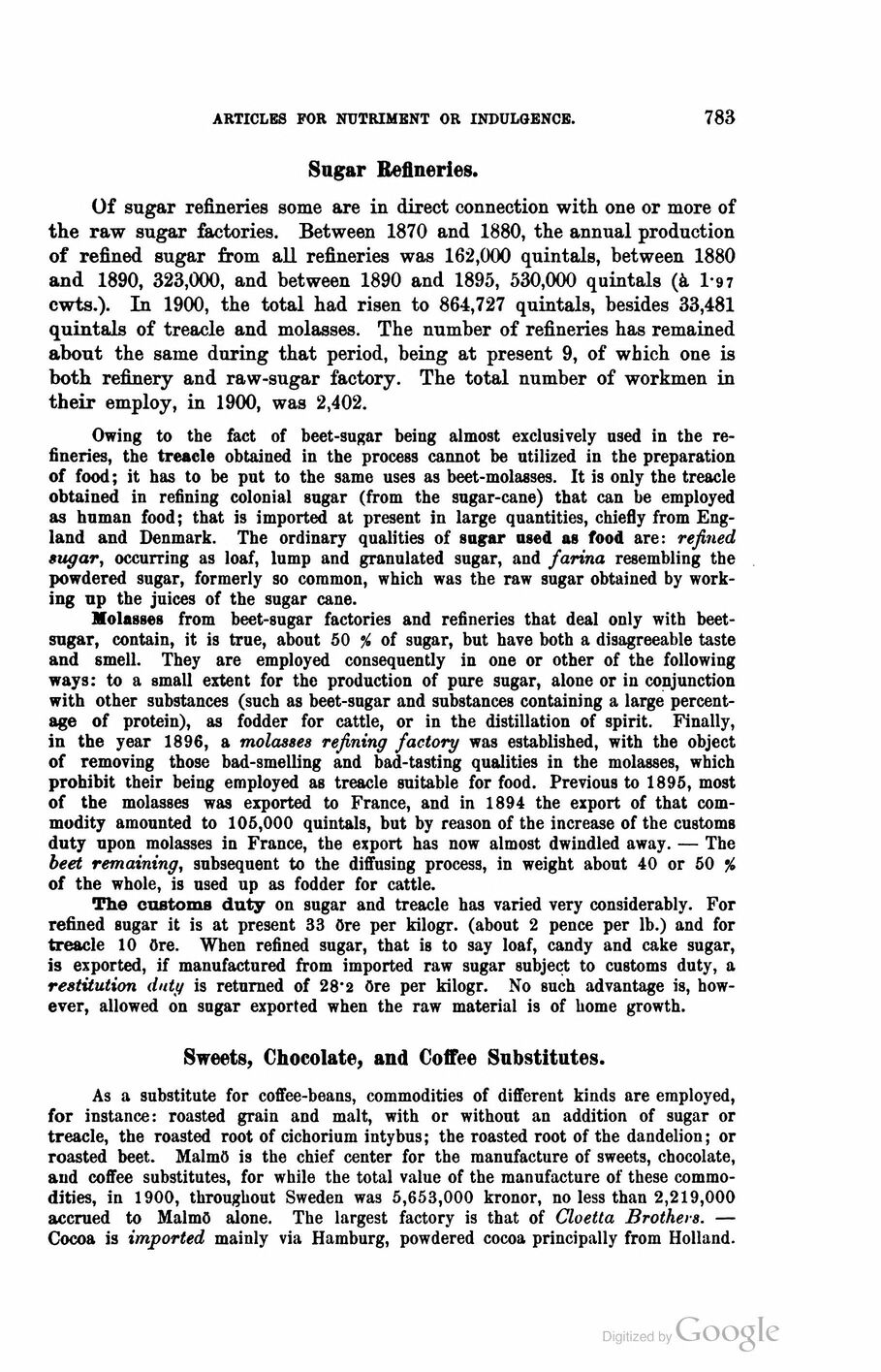
Full resolution (JPEG) - On this page / på denna sida - Second part - X. Manufacturing Industries. By Å. G. Ekstrand, Ph. D., Chief Engineer, Control Office of the Department of Finance - 1. Articles for Nutriment or Indulgence - Sugar Refineries - Sweets, Chocolate, and Coffee Substitutes

<< prev. page << föreg. sida << >> nästa sida >> next page >>
Below is the raw OCR text
from the above scanned image.
Do you see an error? Proofread the page now!
Här nedan syns maskintolkade texten från faksimilbilden ovan.
Ser du något fel? Korrekturläs sidan nu!
This page has never been proofread. / Denna sida har aldrig korrekturlästs.
articles for nutriment or indulgence.
783
Sugar Refineries.
Of sugar refineries some are in direct connection with one or more of
the raw sugar factories. Between 1870 and 1880, the annual production
of refined sugar from all refineries was 162,000 quintals, between 1880
and 1890, 323,000, and between 1890 and 1895, 530,000 quintals (à 1-9 7
cwts.). In 1900, the total had risen to 864,727 quintals, besides 33,481
quintals of treacle and molasses. The number of refineries has remained
about the same during that period, being at present 9, of which one is
both refinery and raw-sugar factory. The total number of workmen in
their employ, in 1900, was 2,402.
Owing to the fact of beet-sugar being almost exclusively nsed in the
refineries, the treacle obtained in the process cannot be utilized in the preparation
of food; it has to be put to the same uses as beet-molasses. It is only the treacle
obtained in refining colonial sugar (from the sugar-cane) that can be employed
as human food; that is imported at present in large quantities, chiefly from
England and Denmark. The ordinary qualities of sugar used as food are: refined,
sugar, occurring as loaf, lump and granulated sugar, and farina resembling the
powdered sugar, formerly so common, which was the raw sugar obtained by
working up the juices of the sugar cane.
Molasses from beet-sugar factories and refineries that deal only with
beet-sugar, contain, it is true, about 50 % of sugar, but have both a disagreeable taste
and smell. They are employed consequently in one or other of the following
ways: to a small extent for the production of pure sugar, alone or in conjunction
with other substances (such as beet-sngar and substances containing a large
percentage of protein), as fodder for cattle, or in the distillation of spirit. Finally,
in the year 1896, a molasses refining factory was established, with the object
of removing those bad-smelling and bad-tasting qualities in the molasses, which
prohibit their being employed as treacle suitable for food. Previous to 1895, most
of the molasses was exported to France, and in 1894 the export of that
commodity amounted to 105,000 quintals, but by reason of the increase of the customs
duty upon molasses in France, the export has now almost dwindled away. — The
beet remaining, subsequent to the diffusing process, in weight about 40 or 50 %
of the whole, is used up as fodder for cattle.
The customs duty on sugar and treacle has varied very considerably. For
refined sugar it is at present 33 öre per kilogr. (about 2 pence per lb.) and for
treacle 10 öre. When refined sugar, that is to say loaf, candy and cake sugar,
is exported, if manufactured from imported raw sugar subject to customs duty, a
restitution duty is returned of 28"2 öre per kilogr. No such advantage is,
however, allowed on sugar exported when the raw material is of home growth.
Sweets, Chocolate, and Coffee Substitutes.
As a substitute for coffee-beans, commodities of different kinds are employed,
for instance: roasted grain and malt, with or without an addition of sugar or
treacle, the roasted root of cichorium intybus; the roasted root of the dandelion; or
roasted beet. Malmö is the chief center for the manufacture of sweets, chocolate,
and coffee substitutes, for while the total value of the manufacture of these
commodities, in 1900, throughout Sweden was 5,653,000 kronor, no less than 2,219,000
accrued to Malmö alone. The largest factory is that of Cloetta Brothers. —
Cocoa is imported mainly via Hamburg, powdered cocoa principally from Holland.
<< prev. page << föreg. sida << >> nästa sida >> next page >>